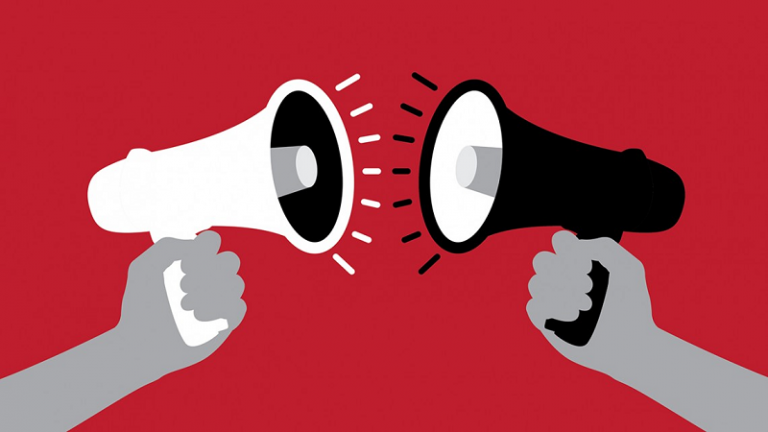
In Nigeria, freedom of speech means different things to different people. But the most accepted meaning of the concept is, “allow me to say whatever it is that I have to say.” This does not imply that what the person is about to say is the truth or that it is healthy. It does not imply that the person’s speech will not destroy another person, or even a state. It does not imply that his message will not mislead others. All he cared about is that he should be free to express himself.
That aside, I noticed many unfavourable things about the way Nigerians exercise their freedom of speech. The first one is the “shut-up-let-me-say-something” approach. Don’t be too fast to say that the leaders are the ones that do this. Many of us, if not all, are guilty of this. We find people like this in all walks of life. Some people believe they have the sole authority to talk and hence, nobody else should do that. To this group of people, everybody else should be their listeners while they exercise the right to free expression.
The next approach is the “believe-what-I-say-or-you-face-the-mob” attitude. Just like the first approach, the people here see themselves as the authority and so every other person must swallow whatever is thrown their way. To them, their words are authority in themselves and so must never be challenged or questioned. These ones are easily found on social media and among some activists. Ndi Igbo kwenu! If you know, you know.
Register for Tekedia Mini-MBA edition 18 (Sep 15 – Dec 6, 2025) today for early bird discounts. Do annual for access to Blucera.com.
Tekedia AI in Business Masterclass opens registrations.
Join Tekedia Capital Syndicate and co-invest in great global startups.
Register for Tekedia AI Lab: From Technical Design to Deployment.
The third approach is the “you-must-not-speak-against-the-crowd” behaviour. I tested this hypothesis during the #ENDSARS protest and the ensuing violence and marvelled at how strong this approach is. Mark you, there is freedom of speech, but this approach and its adopters insist that your freedom of speech must be submitted to them. Hence, if you won’t join the crowd, then keep quiet so that you don’t get hurt. It is quite pathetic, anyway. A lot of people have lost their voices because they got swallowed up in the mob. This approach is the best for the manipulators of “herd-mentality”.

Then, there is the approach used by those who do not really know the limit of “freedom of speech”. In this group, there are several sub-categories, which might not be discussed here. But I believe that those of us that practice them will locate ourselves and work on them. Now, among the sub-categories here, we have the “I-have-the-right-to-insult-you”, “I-am-free-to-slander”, and “I-can-spread-false-information” sub-approaches. These subgroups cut across different ages, genders, educational qualifications, races and what have you. The only group that is not captured here is the emotionally intelligent.
Honestly, this last major approach is the main message of this essay. The thing is becoming unbearable. People come out to spread lies against individuals and organisations and expect that nothing should be done about that. When the victim raises his voice to debunk the lies, he is told that “there is no smoke without fire”. If he takes it up legally, he would be told that he is being “too dramatic”. For reasons unknown, Nigerians derive joy in seeing others weep.
What about those that spread false information? Does freedom of speech includes spreading unverifiable information? Many people, including me, are victims of false information. A lot of people have been attacked and killed because of this. People have lost their jobs and sources of livelihood to this. And guess what, nobody is saying anything about it because it is considered normal in Nigeria.
The one of insulting people is already a norm in Naija. I mean, insult seems to be the current palm oil with which we eat words. When a person has a different view from yours, instead of tabling his argument, he will start and end with terms such as “oponu”, “imbecile”, “fool”, “dummy”, “idiot”, “werey”…please, fill in the rest. But you know what, a lot of people expect you to accept it. I mean, people think it is normal to call people names during arguments. I don’t know who to blame here because we, the English teachers, always made sure students understand how to be logical in their arguments without insulting their opponents. So where do these people learn how to throw insults without making senses?
I once said that Nigerians are not ready for freedom of speech and people reacted in ways that supported the claim. No one is trying to gag you, but you need to talk to yourself. There is no way you should expect everyone to see things your way because your views will definitely be limited to your own experiences. If the next person has something different to say, kindly listen and learn from it. But if your aim is to influence, then look for facts that will support your argument. Unknown to many people, being “oppressive” in exercising freedom of speech shows them in the negative. No one with valid points loses his cool.
But all in all, freedom of speech is not what many Nigerians think it is. It is time for us to go back to the drawing board and relearn how to express ourselves in the public. If your idea is not constructive, please keep it to yourself. And please remember, everyone has the right to contribute towards the betterment of the society.



